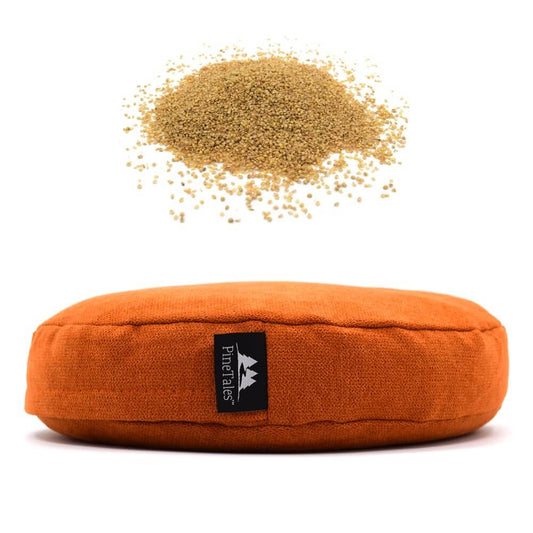There is something special about sleeping, cooking, and relaxing outdoors. This is what makes camping so appealing. I have been camping since I was a small child and fondly remember all the family camping trips we went on.
As an adult, I still love camping, but I do struggle with certain things. For example, I don’t remember tossing and turning in my tent as a child, but as I got older I found it more challenging to sleep. I have gone on many camping trips with my “non-camper” friends, and bedtime is always the hardest for them. Many times I would greet them in the morning feeling refreshed and well-rested just to hear how they hadn’t slept a wink.
Sleeping under the stars often sounds more glamorous than it really is. But, with a good camping pillow, the right equipment, and a solid sleep routine, you can have an incredible sleep surrounded by nature. If you want to sleep better while camping, try the following 11 tips.
- Invest in a supportive pillow.
Don’t underestimate the importance of quality sleeping gear. Putting a cheap sleeping bag on the floor of your tent just isn’t going to cut it. You’ll feel every stone, rock, and twig and find it near impossible to get comfortable. If you are backpacking or portaging, you will need to be mindful of space. By using inflatable items, like a single inflatable mattress and self-inflating camping pillow, you can easily fit your sleeping gear in a bag.
Our camping pillow features an ergonomic design to provide you with superior neck support and has a thin fiber layer for extra comfort. You won’t have to worry about it deflating overnight either. It has a leakproof valve to ensure it stays full for days. However, if you need to pack up and hike to your next site, it can quickly be deflated and packed away in its own storage case.
Alternatively, if you are driving to your campsite and have the storage space, try a shredded latex pillow. The highly responsive latex will provide you will plenty of support and comfort. To make it easier, you don’t need to worry about extra pillowcases either as it comes with its own super soft case, giving you both comfort and functionality. It’s so great you’ll want to use it at home too!
- Keep bugs away.
There’s nothing like the sound of a lone mosquito buzzing around your tent. Like a looming threat, it will keep you on edge and swatting through the darkness. Fortunately, preventive measures can help keep bugs away and allow you to sleep comfortably.
First, ensure there are no holes in your tent and keep the door closed. If you are sleeping under the stars without a tent, consider a mosquito net. If bugs are really bad where you are camping, you can use bug repellent or essential oils on your skin. Just remember not to spray your tent or any waterproof materials like your sleeping bag, as strong repellents like DEET can strip away its protective shield. Further, wearing long sleeves and pants can help protect you from other bugs like ticks.
- Have some cushioning between you and the floor.
As mentioned earlier, the items you choose will depend on how much space you have. If you have limited storage space and are backpacking, you can use a thin yoga mat or egg crate mattress topper that rolls up and can be attached to the side of your mattress. Alternatively, some sleeping bags now come with a built-in mattress for extra support. If you have more space, consider a “bed in a bag” that will get you off the ground. The more similar your camp bed is to your bed home, the better.
- Use temperature controlled bedding.
If you are a novice camper, you may have trouble navigating the fluctuating temperatures in the wilderness. Temperatures and weather can change quickly, and you need to be prepared for it all. Look for bedding that is breathable so you don’t overheat. Sleeping bags made for 3 or 4 seasons are great and can be adapted to the temperature, so you don’t need to bring additional bedding.
- Clean up your campsite before bed.
Many campers find they are a little on edge when sleeping outdoors. A rustle in the bushes or the breaking of a twig has sent shivers up my spine once or twice. The threat of animals, especially bears, can make you nervous and keep you up at night. You can help prevent any unwanted visitors by ensuring there is nothing on your campsite to attract them.
Before going to bed, do a “walk around” – look around your campsite for any food, food waste, or garbage. Pack it away in your car or hang it from a tree away from your campsite. If in bear country, be extra cautious and wash/pack away cooking equipment and clothes you may have cooked in. Animals have a strong sense of smell and will be attracted to the scent of food.
- Avoid scary stories before bed.
A popular camping tradition is to go around the campfire sharing spooky stories and horror tales. Though it may be fun at the time, these can cause camping nightmares and make you too scared to fall asleep. It doesn’t matter how old you are; hearing about a killer on the loose or a blood-thirsty grizzly bear before going to bed isn’t going to help you fall asleep!
- Make sure your pet is comfortable.
Even if you have the most comfortable bed with your shredded latex pillow, temperature-controlled sleeping bag, and supportive mattress – you won’t sleep if your pet isn’t. Just like humans, pets can have a hard time adapting to new sleeping arrangements. If you are sharing the tent with them and they are restless, they’ll keep you up too.
To keep your pet comfy and help them sleep well, bring some of their comforts from home. For example, if they sleep on a millet hulls dog bed at home, you should bring it with you. Put their millet hulls dog bed in your tent, so they have a familiar and comfortable spot to settle for the night. When your dog had a good sleep, so will you.
- Listen to white noise.
If you live in the city, the sounds of traffic, distant yelling, and sirens could help you fall asleep.
When you are in the forest, the silence can be distracting. Alternatively, the strange sounds of nature like loud croaking frogs, crickets, birds, and wind rustling through the trees can keep you up. To prevent this, bring a white noise machine or download an app on your phone.
- Bring comforts from home and try to stick to the same routine.
Sometimes it doesn’t matter if you are in a 5-star hotel or a tent in the mountains; when you are away from your own bed and out of your sleep routine, it can make it difficult to fall asleep. Try to make your sleeping arrangements and bedtime routine similar to the one at home.
For example, if you sleep with an eye mask and earplugs or if you sleep with a shredded latex pillow at home, you should bring them camping.
Your routine can also change significantly when camping. Your bedtime, meals, and things you usually do to wind down may no longer be top of mind, but when they aren’t followed, it can disrupt your sleep. For better sleep, try to stick to the same bedtime, reduce alcohol consumption, and don’t eat too late.
- Take it easy on the sweets and alcohol before bed.
As I already eluded to, the food and drinks you have before bed will impact your sleep. Another camping tradition that isn’t so sleep-inducing is marshmallows. It can be very tempting to enjoy a several smores and a few nightcaps around the campfire, but this will make it more challenging to sleep. Compromise and have one before calling it a night and try to do it earlier in the evening instead of right before you go to bed.
- Open the windows and ventilate your tent.
Keeping your tent all sealed up can create dampness and condensation. Ventilation is critical when sleeping in a tent and will help you stay asleep through the night. Your tent windows will have a screen and rain cover. Open the rain covering slightly to allow air to flow through.
If you don’t, you may be awoken by condensation dripping on your face from your tent ceiling – not the most desirable way to wake up!
You can make the most of your next camping adventure by following these 11 tips for better sleep. As you can see, with the right camping equipment like a camping pillow or shredded latex pillow and a millet hulls dog bed for your furry companion, you can finally enjoy your slumber under the stars.






